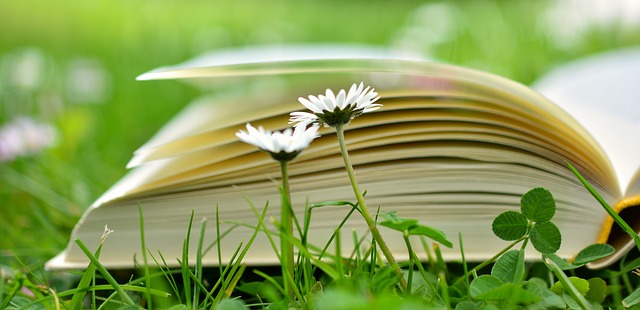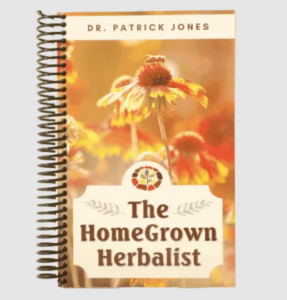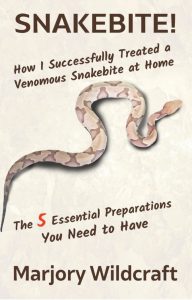Learn more about herbal medicine—from wildcrafting to phytochemicals—using this list of our favorite books on herbal medicine.

Discover the world of home healing—or deepen your skills—with these 13 excellent books on herbal medicine. Image by Ylanite Koppens from Pixabay
Our 13 Favorite Books on Herbal Medicine
Are you interested in herbal medicine? Maybe you want to get started, but you’re intimidated by the huge numbers of books and courses out there.
Or maybe you’re a pro looking to sharpen your skills and push yourself even further, and you don’t want to waste your money on something you already know. Whatever your skill and confidence level, I’ve got some great books for you.*
You May Also Enjoy:
“Siberian Ginseng: The Adaptogen for Astronauts, Athletes, and Anyone Under Stress”
I’ll give you a short rundown on each book, along with its pros, cons, and the skill level it’s written for. Not sure how to evaluate yourself? Check out this article on “The 7 Stages of Home Medicine-Makers.” (Or you can get started on your journey to becoming a medicine-maker by watching our free video series here.)
For our purposes, let’s consider a beginning herbalist to be at level 1 to 3, an intermediate herbalist to be at level 4 or 5, and an advanced herbalist to be at level 6 or 7.
Ready? Then let’s get started!
Books for Beginning to Intermediate Herbalists
“The Beginner’s Guide to Medicinal Herbs” by Rosemary Gladstar
You really can’t go wrong with Rosemary Gladstar. She has a wonderfully approachable style of writing, and she absolutely knows her herbs!
While Rosemary is no stranger to the scientific side of herbalism, she seems to spend more time on the traditional, energetic, and perhaps even mystical side of the subject. This could be a pro or a con, depending on your preferences.
You May Also Enjoy:
“The 7 Stages of Home Medicine Makers”
“7 Ways to Use Pine Trees for Food and Medicine, Year-round”
I’m not sure how Rosemary managed to pack so much information about each preparation and herb in such a short space without it becoming cluttered. The book is simply a joy to read, with a well-organized layout and colorful, eye-pleasing visuals.
This is one of my favorite books to loan out when someone expresses interest in learning about herbalism. Rosemary’s knowledge and zeal come through in her writing, and they are absolutely infectious.
Skill Level
- Beginner
Pros
- Top-Notch Content
- Excellent Layout and Images
- Includes Many Formulas and Recipes
- Covers Many Common Herbs
- Clear Dosage Information for All Ages
Cons
- None: I can’t think of a single thing.
“The HomeGrown Herbalist” by Dr. Patrick Jones
This is one of my favorite herbal medicine books. It’s practical, well laid out, and written in easy-to-understand language.
It goes over standard herbal preparations (and some not-so-standard ones) with tips and tricks missing from many other herb books. Honestly, it goes over a little bit of everything. This book will help you avoid common pitfalls and get the most potency from your herbs.
It mostly talks about herbs individually, but it does have some herbal combinations sprinkled throughout.
You May Also Enjoy:
“5 Benefits of Milky Oats (Plus, Tips On Using Them!)”
Like many good herbalists, Doc Jones has a lot of practical experience. But his situation is fairly unusual. Not only is he an herbalist, but he was also a practicing veterinarian at the time he wrote this book. Because of that, he was practicing herbalism on cases that most herbalists never see. He regularly treated gunshot wounds, snakebites, car accidents, and other really grizzly stuff. The guy knows his stuff.
This is the book I usually pull out when I’ve forgotten a ratio or formula. Don’t worry, he’ll give you an example and guide you through any math. If you’re an experienced herbalist looking for a book that will really challenge you, you probably won’t find too much new information here. But for everyone else, I highly recommend this book.
Skill Level
- Beginner/Intermediate
Pros
- A Little Bit of Everything
- Tips and Tricks!
- Coil Bound: It lays flat on any page. That’s super handy if you want to read the instructions as you work.
- Doc’s Sense of Humor
- Information on Working With Animals
Cons
- I Want More!
- Lack of Depth: While Doc Jones covers numerous topics, he only has space to hit the highlights of each. It contains enough information to be a fully functional guide, but you may soon find yourself wanting more.
(By the way, Dr. Patrick Jones offers fantastic training in herbal medicine via his HomeGrown Herbalist School of Botanical Medicine. It’s one of our favorites!)
“The Essential Survival Guide to Medical Preparedness” by Rebecca Potter, MH, & Col. Edward Behling
This is a great quick-reference book for all those preppers and survivalists out there. It’s set up to be an all-in-one book for medical self-sufficiency. In its pages, you’ll find strategies for dealing with numerous injuries and illnesses, whether physical, psychological, or emotional.
You May Also Enjoy:
“Oatstraw Benefits: Stress Reliever, Love Potion, Brain Booster, and More”
“Calendula: Lymph Mover, Detoxifier, Cancer Fighter, and Skin Beautifier”
One of the selling points of this book is that it’s not just an herb book. It gives herbal, essential oil, reflexology, and acupressure strategies for each condition. But the downside of having all this information in one book is that it can’t go into great detail on any of them. Still, the sheer breadth of information in the book makes it a good choice for a survival library.
Skill Level
- Beginner/Intermediate
Pros
- Multiple Disciplines: Herbs, essential oils, reflexology, acupressure
- Spiral Bound: You can lay the book open on any page to read while you work on someone.
Cons
- A Mile Wide and an Inch Deep: With all the content this book tries to cover, it doesn’t have space to go into much detail on any one topic. The information on individual plants is particularly limited.
“Encyclopedia of Herbal Medicine: 550 Herbs and Remedies for Common Ailments” by Andrew Chevallier, FNIMH
This one surprised me. I had originally thought it would make a nice coffee table book—something to thumb through while I looked at the pretty pictures. But it turned out to be a resource I kept going back to.
With the number of herbs presented, it can’t go into great detail on any of them, but it’s an excellent place to get the basic rundown on an herb.
You May Also Enjoy:
“How to Eat Acorns: The Absolute Easiest Way”
Each herb profile includes its habitat, cultivation, related species, key constituents, key actions, a summary of related research, common uses, and traditional uses. It even has selected preparations with doses. Plus, the pictures add to the visual pleasure of reading it.
You’ll also find relatively short sections in the back on growing and harvesting plants, making various preparations, and treating various ailments. It’s a good all-around summary of herbalism and a wide variety of plants.
Skill Level
- Beginner/Intermediate
Pros
- Visually Pleasing
- 550 Herbs Presented
- Concise Information on Each Herb
Cons
- Lack of Depth: The Information is certainly useable, but it only scratches the surface with each herb.
Books for Intermediate to Advanced Herbalists
“Rosemary Gladstar’s Herbal Recipes for Vibrant Health” by Rosemary Gladstar
This is a perfect second book for Rosemary Gladstar fans who are ready to move on to more detailed information and formulas. It has sections on various health and beauty issues; herbs for men, women, children, and elders; and a much large selection of plant profiles.
The sheer number of herbal formulas alone would make this book worth the purchase price. But add in the specialized information and Rosemary’s wealth of wisdom and experience, and you’ve got an excellent resource that you’ll keep turning back to.
You May Also Enjoy:
“Making and Using a Poultice … Even On Hard-To-Treat Areas!”
The only downside that I can find to this book is that its layout feels a bit cluttered. It may have something to do with the unusual shape of the book. It’s a square, and it just feels a little weird to read.
Also, this book lacks the vibrant colors of Rosemary’s beginner’s guide. Most of the pictures are in black and white. I think I was spoiled by the smooth layout of the other one.
But other than those two minor issues, this is a really solid herbal guide.
Skill Level
- Intermediate/Advanced
Pros
- Ton of Herbal Formulas!
- Many Plant Profiles
- Specialized Information
Cons
- Layout: It feels a bit cramped due to the unconventional book dimensions.
“Herbal Antibiotics: Natural Alternatives for Treating Drug-Resistant Bacteria” & “Herbal AntiVirals: Natural Remedies for Emerging & Resistant Viral Infections” by Stephen Harrod Buhner
Are you concerned about drug-resistant superbugs and pandemic diseases? Then these 2 books are right up your alley.
Stephen presents a well-researched and referenced, science-based approach to dealing with infectious agents. This is not a book for those looking for insights into the spiritual or energetic aspects of herbalism.
In each book, Stephen will address the problems that our modern medical system is facing in regards to these infection agents. (Hint: We’re losing ground to the superbugs.)
You May Also Enjoy:
You’ll then find profiles on several herbs, with details on which bacteria or viruses they deal with best. Each book ends with information on making various herbal preparations and a collection of herbal formulas with suggested doses.
Sometimes the book gets a bit dry and serious, but then Stephen will break out into a rant or funny side story that keeps you entertained. Beginners could absolutely use this book, though I suspect that intermediate and advanced herbalists would get more use out of it.
Skill Level
- Intermediate /Advanced
Pros
- Well Researched and Referenced
- Important Information: These books could be lifesavers in the near future.
Cons
- Slightly Technical: These books are entirely readable without a medical background, but may stretch your vocabulary at times.
“Principles and Practice of Phytotherapy: Modern Herbal Medicine” by Kerry Bone and Simon Mills
This is a book for those who are ready to get serious about herbalism. It has over 1,000 pages of well-researched and cited information designed to give you in-depth knowledge about plants and pathologies.
The book is divided into 3 sections. The first hundred pages address herbalism as a whole. This is the section for discussing the basic principles of herbalism, establishing its validity, and optimizing safety.
The next section looks at herbal application. It addresses various diseases and disfunctions of the body, possible causes, and strategies for treatment. This section also covers body systems and the disfunctions common to them.
You May Also Enjoy:
“Homemade Apple Cider Vinegar, the Easy Way—With 29 Uses”
“How To Identify Plants Quickly”
“19 Benefits of Hibiscus: Blood Pressure Regulator, Cancer Fighter, Liver Protector, and Much More!”
The third section is the material medica. The book goes into great detail about the properties, application, and research surrounding 50 herbs. The information can get technical at times and is not for the faint of heart. A background in chemistry or medicine is not required, but it also wouldn’t hurt.
This book is very much rooted in a western, scientific approach to medicine. That’s excellent for those looking to understand the phytochemicals and their reactions. But this is not a book for those wanting to learn about energetics or the other, less tangible, aspects of herbalism.
Skill Level
- Advanced
Pros
- Highly Detailed
- Well Researched and Cited
- Tons of Information
Cons
- Very Technical: It’s all good material, but it’s going to take some effort to get through it.
“Medical Herbalism: The Science and Practice of Herbal Medicine” by David Hoffmann, FNIMH, AHG
This is a book for those who want want to get serious about the scientific side of herbalism, but aren’t ready to commit to the 1,000+ pages of “Principles and Practice of Phytotherapy” (PPP). “Medical Herbalism” might be thought of as the lite version of the 2. It comes in at just over 650 pages, and covers much of the same information.
But it’s not just a clone. “Medical Herbalism” spends much more time on the phytochemical (plant chemistry) side of herbalism. It details what the different compounds are, what their presence can indicate, and how this applies to herbalism.
You May Also Enjoy:
“Using Dandelions: 31+ Recipes & Remedies”
The book also includes many more herb profiles. It covers around 3 times as many herbs as PPP. Granted, the profiles are much shorter, hitting only the highlights.
Like PPP, “Medical Herbalism” is heavily geared toward a conventional, scientific approach to herbs. As such, you will find precious little here about the energetic, mysterious, and subtle aspects of herbalism.
Skill Level
- High Intermediate/Advanced
Pros
- Well Researched and Cited
Cons
- Can Be Technical: It’s not nearly as bad as PPP, but you can still get bogged down by information.
Books for Everyone
“Peterson Field Guide to Medicinal Plants and Herbs of Eastern and Central North America” by Steven Foster and James A. Duke
Before we start, let me mention that there’s also a Peterson Field Guide to Western North America. Be sure to pick up the version that covers your area. If you’re outside of North America, these books will obviously be less useful for you.
This book is primarily an identification guide. It’s good for the front end of herbal medicine, if you need to find your plants in the wild. It has quick, detailed entries on numerous species, with full-color pictures and tips on where to find them. While it will tell you what these plants are used for, it gives very little information on the specifics of how to use them.
Skill Level
- Everyone
Pros
- Many, Many Plants
- Color Images
- Quick, Thorough Plant Identification Guides
Cons
- Few Specifics on Use
- Region Specific
“Snakebite! How I Successfully Treated a Venomous Snakebite at Home; The 5 Essential Preparations You Need to Have” by Marjory Wildcraft
This one will be a bit different from the other books on the list. Rather than being a traditional herbal medicine book, this is the recounting of an unpleasant snake encounter that Marjory treated at home. It not only discusses the treatment method, but also how you feel, physically and emotionally, during an emergency.
It’s one thing to memorize a list of herbs and procedures. It’s quite another to feel your foot start swelling as adrenaline fills your brain and your family is panicking and urging you to go to the E.R. How will your herbal convictions hold up then?
Marjory guides you step-by-step through her experience, sharing her fears, doubts, and all the stress that went along with it. In that respect, it’s probably one of the most practical books on this list.
You May Also Enjoy:
“How to Make Your Own Tinctures, Salves, and Essential Oils”
“Snakebite!” is a quick and easy read, at just under 50 pages, and the price reflects that. It’s direct and to the point, because nobody wants to thumb through a 500-page desk reference when their foot is the size of a cantaloupe.
And while this has no bearing on the content of the book, the cover has a very pleasant, smooth texture that’s a lot of fun to run your fingers over. I know that’s an odd detail to include, but I think about it every time I pick it up.
Skill Level
- Everyone
Pros
- Short
- Inexpensive
- Real-World Knowledge
- Emotionally Educational
- References to Additional Information
Cons
- Short: Yes, I know I also listed that as a pro.
- Limited Number of Herbs Presented (Mostly Prickly Pear): But it’s nice to see that you don’t need 50 different herbs to heal yourself.
“Healing Wise (Wise Woman Herbal)” by Susun Weed
You don’t have to be a woman to read a Wise Woman Herbal. Susun Weed is brimming with confidence and personality. I absolutely love her tone and style. She spends roughly 1/3 of the book talking about the wise woman tradition and what you might call the philosophy of herbal medicine. The last 2/3 of the book is a deep dive into 7 herbs, with a short herbal pharmacy section at the end.
Yes, she only covers 7 herbs in this book. But by the time you’re done, you’ll know enough about those 7 herbs to do just about anything with them. Susun’s whimsical and impassioned writing style makes the personality of each plant come to life. She takes something that could very easily become a dull lecture and makes it feel more like a conversation.
Skill Level
- Everyone
Pros
- Stylized: Susun’s worldview and personality come through on every page. This is what written language should be like.
- Plenty of Recipes and Formulas
- Highly In-Depth Information
- Easy to Read: The tone and style may carry you away.
Cons
- Stylized: If you don’t enjoy people with strong personalities or a more spiritual view on herbal medicine, then this book may not be for you.
- Few Herbs: There are only 7.
“The Herbal Medicine-Maker’s Handbook: A Home Manual” by James Green
The two words I would use to describe this book are “practical” and “approachable.” The words “treasure trove” also come to mind. It has chapter after chapter of detailed information on numerous herbal preparation methods and variations, all written in a friendly, easy-to-follow tone.
This is a book for people who ask, “What do I actually do with this plant?” Scratch that. This is a book for everyone. Even if you already make your own medicines, you’ll learn more here.
The information isn’t difficult or technical. But there’s so much here, even an experienced herbalist will keep going back again and again.
Skill Level
- Everyone
Pros
- So Much Great Information: Did I mention the word “treasure-trove”?
- Practical Guide for Application
- Very Readable
- Excellent Illustrations
Cons
- Limited Plant Information: For the most part, this book assumes you already know the medicinal properties of the plants. Its main concern is to help you extract those properties and use them.
What Do You Think?
There are so many good books out there, I couldn’t come close to reviewing them all. If I missed one of your favorites, let us know about it in the comments. Or if you have a different reaction to one of the books above, let us know about that, too!
__________________
This is an updated version of an article that was originally published on January 5, 2019.
The Grow Network is a participant in the Amazon Services LLC Associates Program, an affiliate program designed to provide a means for our team to earn fees for recommending our favorite products! We may earn a small commission, at no additional cost to you, should you purchase an item after clicking one of our links. Thanks for supporting TGN!

Scott Sexton is a TGN Trailblazer, a highly experimental gardener, an unrelenting weed-eater, and a largely non-profit herbalist (much to his wife’s chagrin). When Scott is not teaching foraging classes, testing out theories in the garden, or grazing in the forest, he can be found at his Facebook page, “A Forager’s Guide to the Zombie Apocalypse.”





















COMMENTS(13)
great list!
Thanks Scott for the LIST..
From the other side of Trump’s Wall where we live healthy foraging lifestyles in the rainforest !!
Thank you for the list. I am old, so some of my favorite herbal books have been around a while. The School of Natural Healing, by .dr. Christopher Green Pharmacy, by James Duke Herbs for Dummies, by Christopher Hobbs Back to Eden,, A Modern Herbal by Mrs. M Grieve vol 1+2, all of Samuel Thayer’s books on Foraging. Books by Gloria Gladstar. I would imagine most people have their favorite books.
@bonnie idk how old “old” is but I have almost all of the books you listed and most the books listed above. I love all things herbal and some of the older books have better hands on knowledge than some of the more modern books. “All knowledge is worth having”_Jacqueline Carey
Actually, Sam Thayer’s books are recent! I love them!!
Wow I actually have some of these books!!! But a great list to start looking at other ones.
The one I would HAVE to add for intermediate to advanced would be “Evolutionary Herbalism” by Sajah Popham.
It’s intense as anything he does is…but so deliciously good.
AND idk how I missed but….Dr. Patrick Jones has a BOOK?!?! This is my next purchase, (be right back?)!
I hand’t heard of that one, herbantherapy. Thanks for the tip!
Absolutely! This is one of the most in-depth books on herbalism and alchemy I have read as yet.
This man knows his plants. Must read for advanced practitioners.
This is an interesting list. It includes one of my all time faves, Healing Wise by Susun Weed. Not many herbs, but sooo thorough!
I love that you mention that Margery’s book shows you don’t need many herbs for healing yourself. I think Healing Wise also makes that point.
David Winston’s books and Matthew Wood’s books
Great list! Thank you! So many favorite books here. I love S. Buhner’s books, they were among the first books I bought. He’s my kind of person: lots of research. I also love Rosalee de la Forêt’s books, and my new other favorite is “Body into Balance: An Herbal Guide to Holistic Self-Care” by Maria Noel Groves. I’m also considering Lisa Ganora’s “Herbal Constituents, 2nd Edition: Foundations of Phytochemistry” book. I just took her “Make Better Medicine: Solubility and Extraction” online course, and although it was good, it was very basic and left me wanting more information and I’m hoping to find it in her book. Has anyone read this one yet? Yes, this one is definitely for advanced herbalists (which is not me), or those who are scientifically-inclined.
nice overview…got some and will save for marjories and a couple of others…a gr8 library is a smart investment especially if the knowledge is important for health and happy happy..manythxs scott and GN for sharing